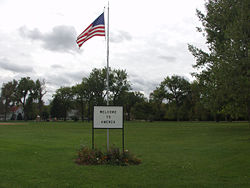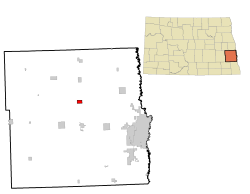Amenia, North Dakota
| Amenia, North Dakota | |
|---|---|
| City | |

Amenia, North Dakota
|
|
 Location of Amenia, North Dakota |
|
| Coordinates: 47°0′14″N 97°13′12″W / 47.00389°N 97.22000°WCoordinates: 47°0′14″N 97°13′12″W / 47.00389°N 97.22000°W | |
| Country | United States |
| State | North Dakota |
| County | Cass |
| Founded | 1880 |
| Area | |
| • Total | 1.43 sq mi (3.70 km2) |
| • Land | 1.43 sq mi (3.70 km2) |
| • Water | 0 sq mi (0 km2) |
| Elevation | 951 ft (290 m) |
| Population (2010) | |
| • Total | 94 |
| • Estimate (2014) | 95 |
| • Density | 65.7/sq mi (25.4/km2) |
| Time zone | Central (CST) (UTC-6) |
| • Summer (DST) | CDT (UTC-5) |
| ZIP code | 58004 |
| Area code(s) | 701 |
| FIPS code | 38-01940 |
| GNIS feature ID | 1027695 |
Amenia (/əˈmiːniə/ ə-MEE-nee-ə) is a city in Cass County, North Dakota, United States. The population was 94 at the 2010 census. Amenia was founded in 1880.
The town is the site of several transmitter towers of Fargo broadcast television and radio stations.
Amenia was the home of North Dakota governor William L. Guy before and after holding office.
The town of Amenia traces its roots to a group of wealthy New England investors from the villages of Amenia, New York and Sharon, Connecticut which formed the Amenia and Sharon Land Company and, in July 1875, under the representation of Eben W. Chaffee, purchased 27,832 acres (11,263 ha) of land from the then bankrupt Northern Pacific Railroad. The stockholders' plan had been to develop the land enough to sell it to settlers, thus quickly realizing a return on the investors shares. However, taking notice of the success of the Cass-Cheney-Dalrymple bonanza farm near Casselton, North Dakota, and the exceptional fertility of the soil, Chaffee convinced the stockholders to hold the land and break the prairie sod for the production of wheat. The company built a depot and, in 1881, a grain elevator in order to move their product to market. Around them grew the village of Amenia. By the mid-1880s, the town had grown enough to require school services and to build a Congregational church. Chaffee was among its earliest residents and continued to be a central figure in the development of the town.
...
Wikipedia
